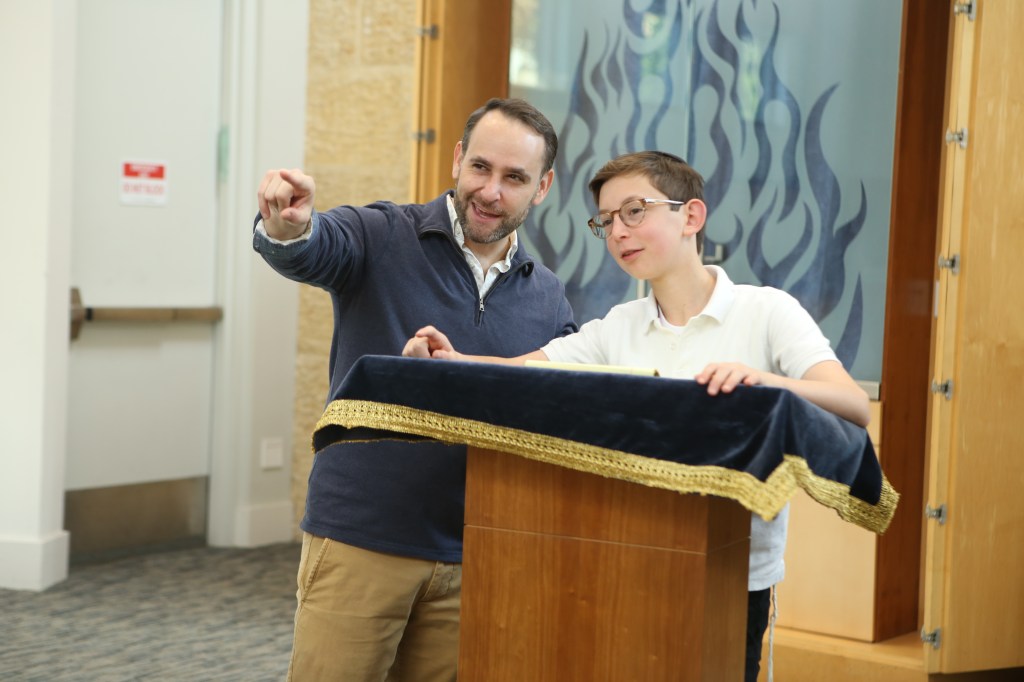As you may or may not know, I have a side business of working with bar/bat mitzvah students to write d’var Torahs and speeches for their big day. (Cough – www.mitzvahspeechces.com – cough!) Over several weeks, I sit and learn with them the deeper meaning of their Torah portion and then we write a speech together (not unlike one of my blog posts).

But not long ago I was helping my niece choose her Torah portion. Her primary criteria? It must have a challenging message about feminism! Due to various restrictions in choices, we found that parshas Yisro was available. Inspired by a question from my father, I posed, “The 10th Commandment says you shouldn’t covet your neighbor’s wife, but it says nothing about coveting a husband. Isn’t that interesting?” Sure enough, my niece took to the idea and requested to her synagogue that Yisro be her parsha. I look forward to digging into the text and commentaries with her to find the answers.
But then something interesting happened.
After our meeting, her mother decided to use ChatGPT to write an essay with the prompt of “feminism and the 10th Commandment.” If you’re not familiar, artificial intelligence (A.I.) programs known as chatbots have been developed to mimic human conversations with impressive and eerie results. Last November, OpenAI released ChatGPT to write articles and essays with little more than a prompt. So how did the chatbot’s dvar Torah turn out? Read for yourself.
As we gather today to discuss the Torah portion Yitro, I want to focus on the theme of feminism and the tenth commandment in particular. This ancient text speaks to the experiences and struggles of women in ways that are still relevant today. The tenth commandment, “You shall not covet your neighbor’s house, wife, or possessions” (Exodus 20:17), is often understood as a prohibition against envy and greed. However, when we look at the way this commandment is worded, we can see that it places a higher value on men’s possessions and their wives, rather than treating them as equals. This language reflects the patriarchal society in which the Torah was written, where women were often seen as property to be owned and controlled.
Some may argue that the reason for this language is because women were considered more valuable than men. This argument, however, fails to take into account the fact that women were not seen as equal to men in this society. They were not afforded the same rights, opportunities, or freedoms as men, and were often treated as second-class citizens. In fact, the value placed on women in this society was often tied to their ability to bear children and fulfill their roles as wives and mothers. This meant that women were often seen as objects of exchange, being traded and sold for the benefit of men. This is not a sign of value, but rather a reflection of the ways in which women were oppressed and marginalized in this society.As feminists, it is our responsibility to challenge and resist this kind of language and the harmful beliefs and practices that it perpetuates. We must work to create a society where men and women are treated as equals, with the same rights and dignity. This includes challenging systems of patriarchy and male supremacy that seek to diminish the value and agency of women.
ChatGPT
In conclusion, the Torah portion Yitro reminds us of the ongoing struggle for gender justice and equality. Let us continue to challenge and resist systems of patriarchy and male supremacy, and work towards a world where all people are treated with respect and dignity.
For a moment, I was quite scared about my profession. The A.I. definitely knows sentence structure better than my students and it certainly has an opinion. Is my writing truly under threat? What about the Rabbi? Will the wisdom of their Shabbos mourning sermon remain a rare and moving gift? Or will Rabbi GPT receive their smicha and start poskening halacha (ruling on Jewish law)?
If you look a little more closely at the A.I.’s essay, you’ll start to notice some issues. There’s a lack of personal experience, as we’d expect from a computer program. The A.I. doesn’t support either side of the argument with specific sources. It doesn’t challenge any assumptions and clearly pulls from a general knowledge. But the most interesting thing is that the writing poses something I wouldn’t have expected from a computer program. Bias.
It seems because the prompt was about feminism, the essay was written from a strong feminist perspective. It didn’t give an explanation for why the 10th Commandment presumed gender when nowhere else in the 10 Commandments does it do that. Nor does it have breath of scope to comment that when the Torah was offered to the Jewish people God asked the women first! (See Rashi on Exodus 19:3) Instead, the essay operated from the perspective that the verse was an example of gender inequality and used it as a platform to further an agenda. In short, it didn’t try to learn from the passage, it only commented on it.
This is not the only time bias has been an issue with A.I. Recently Twitch streamed a fully A.I. generated and never ending Seinfeld modeled sitcom called “Nothing, Forever.” But about two months after launch, the show was banned for making transphobic jokes. It seems that “Machine Learning bias” or algorithm bias is quite an issue as the A.I. learns from human interaction and oftentimes ends up incorporating erroneous assumptions and attitudes into their data.
I’m sure no readers are going to be surprised that A.I. isn’t ready to replace the pulpit Rabbi. But the reason why not is the thing to consider. The speeches that move us (whether it is a Rabbi’s sermon or from a leader at the forefront of a political moment) don’t regurgitate collected facts. They add insights that the world isn’t ready to express yet, but is more than ready to hear. That’s why big change is called a social movement.
As a bar/bat mitzvah speech writer, my job isn’t just to teach a Torah idea, it is to make the Torah relevant to the student. I do that by finding something in the text that is relevant to them and I apply it to their lives, then challenge them about it. “What would you do in this situation?”, “Do you agree with this moment?” and most of all, “Where have you seen this IN YOUR LIFE?” It is said by the sages that learning Torah as an intellectual exercise will yield little good. It isn’t until one considers and wrestles with the Torah for the sake of life and connection that the magic happens. The Torah acts to challenge our biases, not reinforce them. As long as that is key, the Rabbi will always have a place above the most complex algorithm.



So grateful I thought to look up your blog out of the blue, when ages ago I would always check it. Just this morning I was the victim of a conversation about this horrible ‘article writing robot’ And I refuse to be interested in it, excited about its abilities, or even hear about it for a moment!! I am quite relieved to see your sentiments as to why it won’t readily ‘replace rabbis,’ etc. Your words are important. I am disturbed at its capabilities! And your article has given me peace!!
LikeLike